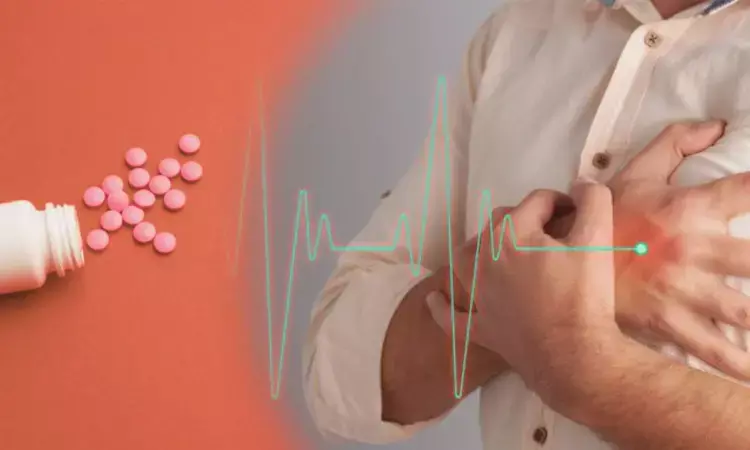- Home
- Medical news & Guidelines
- Anesthesiology
- Cardiology and CTVS
- Critical Care
- Dentistry
- Dermatology
- Diabetes and Endocrinology
- ENT
- Gastroenterology
- Medicine
- Nephrology
- Neurology
- Obstretics-Gynaecology
- Oncology
- Ophthalmology
- Orthopaedics
- Pediatrics-Neonatology
- Psychiatry
- Pulmonology
- Radiology
- Surgery
- Urology
- Laboratory Medicine
- Diet
- Nursing
- Paramedical
- Physiotherapy
- Health news
- Fact Check
- Bone Health Fact Check
- Brain Health Fact Check
- Cancer Related Fact Check
- Child Care Fact Check
- Dental and oral health fact check
- Diabetes and metabolic health fact check
- Diet and Nutrition Fact Check
- Eye and ENT Care Fact Check
- Fitness fact check
- Gut health fact check
- Heart health fact check
- Kidney health fact check
- Medical education fact check
- Men's health fact check
- Respiratory fact check
- Skin and hair care fact check
- Vaccine and Immunization fact check
- Women's health fact check
- AYUSH
- State News
- Andaman and Nicobar Islands
- Andhra Pradesh
- Arunachal Pradesh
- Assam
- Bihar
- Chandigarh
- Chattisgarh
- Dadra and Nagar Haveli
- Daman and Diu
- Delhi
- Goa
- Gujarat
- Haryana
- Himachal Pradesh
- Jammu & Kashmir
- Jharkhand
- Karnataka
- Kerala
- Ladakh
- Lakshadweep
- Madhya Pradesh
- Maharashtra
- Manipur
- Meghalaya
- Mizoram
- Nagaland
- Odisha
- Puducherry
- Punjab
- Rajasthan
- Sikkim
- Tamil Nadu
- Telangana
- Tripura
- Uttar Pradesh
- Uttrakhand
- West Bengal
- Medical Education
- Industry
Comparative Effectiveness of SGLT-2 Inhibitors: Low-Dose Dapagliflozin Falls Short in Heart Failure Prevention, Study

USA: A recent study published in JAMA Internal Medicine has evaluated the comparative effectiveness of individual sodium-glucose cotransporter 2 (SGLT-2) inhibitors in treating type 2 diabetes patients with cardiovascular conditions.
The researchers found that individual SGLT-2 inhibitors showed similar cardiovascular effectiveness at clinically effective doses; however, low-dose dapagliflozin was less effective in reducing heart failure hospitalization compared to empagliflozin.
The researchers note that the cardiovascular benefits and safety of SGLT-2 inhibitors have primarily been studied in placebo-controlled trials, leaving the comparative effectiveness and safety of individual SGLT-2 inhibitors largely unknown. HoJin Shin, Brigham and Women’s Hospital and Harvard Medical School, Boston, Massachusetts, and colleagues aimed to compare the use of canagliflozin and dapagliflozin with empagliflozin for a range of outcomes, including myocardial infarction (MI), stroke, heart failure hospitalization, all-cause death, and safety concerns such as diabetic ketoacidosis (DKA), lower-limb amputation, bone fractures, severe urinary tract infections (UTI), and genital infections. It also explored whether the effects varied based on dosage or cardiovascular disease (CVD) history.
For this purpose, the researchers conducted a comparative effectiveness study using target trial emulation with data from three US claims databases, focusing on adults with type 2 diabetes (T2D). The study covered the period from August 2014 to June 2020, with a follow-up of up to 8 years and analysis completed by July 2024. The study examined the first dispensing of canagliflozin, dapagliflozin, or empagliflozin in individuals with no prior SGLT-2 inhibitor use in the last 365 days. Hazard ratios for outcomes were calculated using weighted Cox proportional hazards models, adjusted for 129 confounders, and pooled via meta-analysis.
The study led to the following findings:
- A total of 232,890 patients receiving canagliflozin, 129,881 receiving dapagliflozin, and 295,043 receiving empagliflozin were identified across the databases.
- Patients initiating canagliflozin or dapagliflozin were less likely to have diabetes-related conditions or a history of CVD at baseline compared to those initiating empagliflozin.
- Both canagliflozin (HR, 0.98) and dapagliflozin (HR, 0.95) showed comparable risk for myocardial infarction (MI) and stroke to empagliflozin.
- Dapagliflozin initiators had a higher risk of heart failure hospitalization (HR, 1.19), particularly at the low dose of 5 mg (HR, 1.30).
- Safety outcomes showed that canagliflozin initiators had a lower risk of genital infections (HR, 0.94) but a higher risk of severe urinary tract infections (HR, 1.13).
- Dapagliflozin initiators had lower risks of genital infections (HR, 0.92) and diabetic ketoacidosis (DKA) (HR, 0.78).
In conclusion, in the comparative effectiveness study involving adults with type 2 diabetes, the individual SGLT-2 inhibitors demonstrated comparable cardiovascular effectiveness at doses recommended for heart health. However, low-dose dapagliflozin was associated with reduced benefits in preventing heart failure hospitalization compared to empagliflozin.
"While the overall safety risks were similar across the three SGLT-2 inhibitors, their distinct safety profiles require careful consideration of individual risks and benefits. Notably, the frequent occurrence of genital infections highlights the need for caution, especially in vulnerable populations such as older adults," the researchers wrote.
Reference:
Shin H, Paik JM, Everett BM, et al. Comparative Effectiveness of Individual Sodium-Glucose Cotransporter 2 Inhibitors. JAMA Intern Med. Published online January 21, 2025. doi:10.1001/jamainternmed.2024.7357
Dr Kamal Kant Kohli-MBBS, DTCD- a chest specialist with more than 30 years of practice and a flair for writing clinical articles, Dr Kamal Kant Kohli joined Medical Dialogues as a Chief Editor of Medical News. Besides writing articles, as an editor, he proofreads and verifies all the medical content published on Medical Dialogues including those coming from journals, studies,medical conferences,guidelines etc. Email: drkohli@medicaldialogues.in. Contact no. 011-43720751


